Online culinary schools help prepare future chefs, bakers, and restaurant owners for the professional world. Earning a certificate, associate, or bachelors in culinary arts online allows you to develop new skills and broaden your knowledge of cooking techniques.
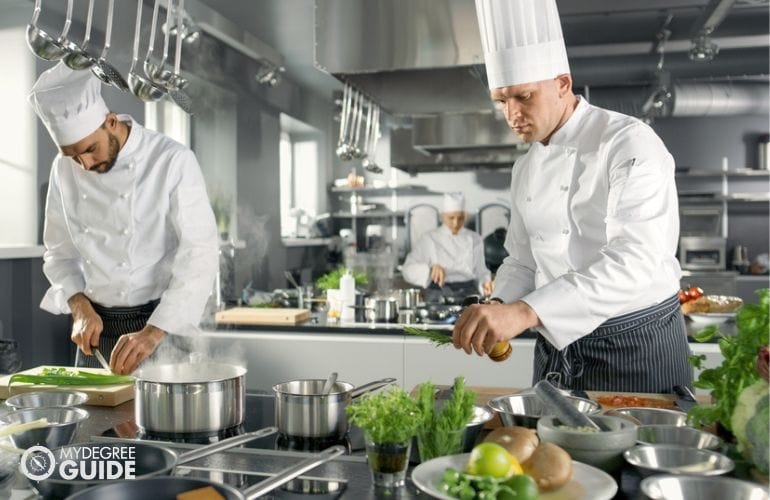
If you love learning about food and different cuisines, culinary school may be the next step on your journey toward a fulfilling career.
Editorial Listing ShortCode:
An accredited online degree offers the same high-quality education as an on-campus program but with much more flexibility in scheduling.
Online Culinary Schools

High school graduates and mid-career professionals alike can benefit from attending culinary schools online. Your level of experience and career goals can help determine whether a certificate, associate’s degree, or bachelor’s degree is the best fit for you.
Select the program that most interests you to jump to that section of the guide:
The program that’s best for you will depend on your personal interests and professional goals.
Online Culinary Certificates

An online culinary certificate program covers the foundational skills for working in a professional kitchen. Specific certificates that you might pursue include ones in baking and pastry, dining room service, and front-house operations.
Although the curriculum differs based on the certificate program you complete, possible coursework includes topics on measuring and preparing ingredients, creating stocks and sauces, baking, and international cuisines.
Editorial Listing ShortCode:
In addition to food preparation, students often also learn about food safety practices and customer service skills. This helps ensure that graduates of these programs provide safe and enjoyable experiences to customers at restaurants, coffee shops, and cafes.
Certificates are generally more affordable than degrees and require less time to complete. They typically prepare students for entry-level positions such as cooks, bakers, servers, hosts, and supervisors.
Online Associate’s Degree in Culinary Arts
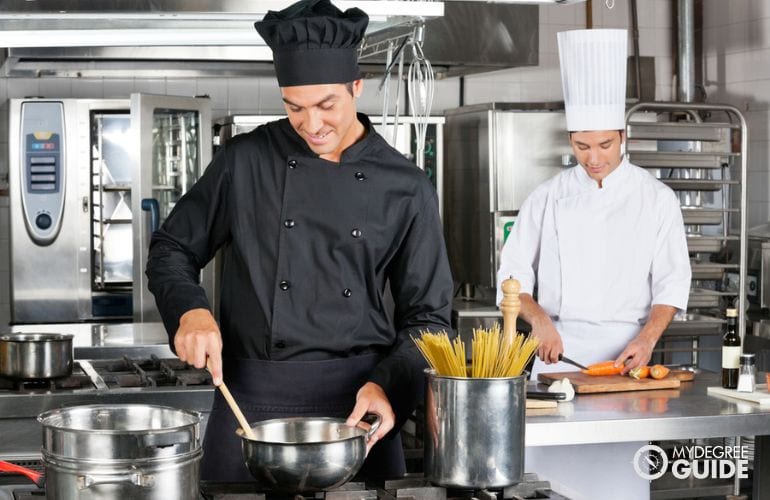
An associate’s degree in culinary arts expands on the skills developed during a certificate program, but completing a certificate is not usually a prerequisite for enrolling. In many cases, students who want to earn a degree choose an associate program in place of a certificate.
During the course of this degree program, students have the opportunity to specialize in an area of interest, such as baking, management, or culinary arts. This provides a broad overview of necessary skills for food service employees. Possible course subjects include nutrition, communication, math, and history. Courses on cooking essentials may cover topics like wines and beverages, regional and global cuisines, and efficient line production.
Editorial Listing ShortCode:
After graduating with an associates degree in culinary arts, you may be qualified for a position as a chef, food writer, or restaurant manager.
Online Bachelor’s Degree in Culinary Arts
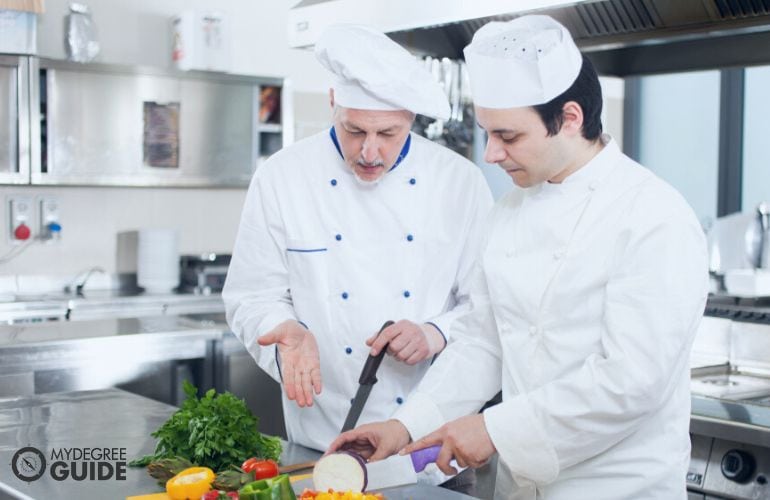
Students who want to develop advanced culinary skills can pursue a bachelors degree. Because they require more extensive study, bachelor’s programs give students the opportunity to explore their interests and learn about more complex techniques.
During a bachelor’s program, you might choose a more technical specialization, such as nutrition, culinary science, or applied food studies. These areas focus on subjects like chemistry, sustainability, and research. Graduates in these content areas often pursue careers as policy analysts or writers, research chefs, or nutritionists. In contrast, students who focus on food business management or culinary arts may become executives, head chefs, pastry chefs, or private caterers.
Editorial Listing ShortCode:
A bachelors in culinary arts online degree may also serve as preparation for a career as a food photographer, stylist, or writer. Some graduates may work toward opening their own restaurant, where they create a custom menu, supervise staff, and oversee all food production.
Common Culinary Specializations

Although all culinary arts degrees relate to cooking, many programs give you the option to select a specific concentration that aligns with your interests and passions. Some of the most common specializations include:
- Baking and pastry. Students specializing in baking and pastry arts learn how to create and decorate breads, cakes, tarts, and other sweet and savory foods.
- Food service management. A food service management concentration focuses on leadership and business skills that are necessary for a career as a restauranter or food service manager.
- Culinary nutrition. During a culinary nutrition program, students learn how to create delicious meals that align with the special dietary needs of customers.
- Wine, beverage, and hospitality. Many restaurants serve alcoholic beverages, and they require professionals to make recommendations, develop creative food pairings, and increase drink sales.
- Farm-to-table. Sustainable restaurants are becoming increasingly popular, and students in farm to table programs learn how to connect with local communities and cook meals with eco-friendly ingredients.
The coursework and field experiences of your culinary program depend on the concentration you select. For example, farm-to-table students might grow ingredients in a local garden while those in a food service management program attend guest lectures by restaurant managers.
Culinary Careers & Salaries
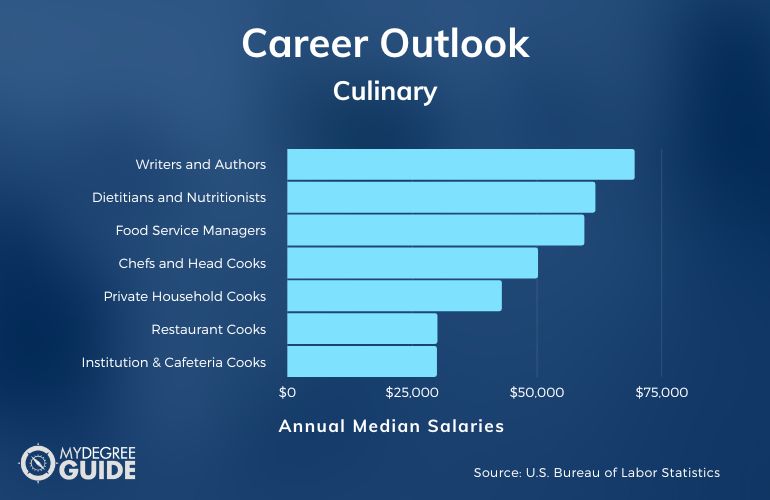
Culinary online degrees are well suited to a variety of career pursuits. In addition to working as a chef, graduates of culinary arts programs may pursue careers as nutritionists, managers, writers, and researchers.
According to the Bureau of Labor Statistics, these are the median wages of some popular career paths for culinary arts students.
| Careers | Annual Median Salaries |
| Writers and Authors | $69,510 |
| Dietitians and Nutritionists | $61,650 |
| Food Service Managers | $59,440 |
| Chefs and Head Cooks | $50,160 |
| Private Household Cooks | $42,910 |
| Restaurant Cooks | $30,014 |
| Institution and Cafeteria Cooks | $29,910 |
| Bakers | $29,750 |
| Food Preparation Workers | $28,780 |
| Food and Beverage Serving and Related Workers | $25,980 |
Many different kinds of employers hire culinary professionals. They include restaurants, hotels, hospitals, schools, and food publications. Some culinary professionals also choose to work independently as private chefs, consultants, and bakers.
Editorial Listing ShortCode:
Data from the Bureau of Labor Statistics shows that job growth in the food service industry is expected to be high over the next several years. For example, chefs and head cooks have a projected growth rate of 15%, which is much faster than the average rate for all occupations.
How to Choose a Culinary School Online Program

When you research culinary arts schools online, you will most likely discover an array of options. To help narrow down your search, you might consider these key factors:
- Curriculum. You can search for a culinary school with a curriculum that aligns with your professional goals. It’s also helpful to look for foundational courses like food safety that teach students about guidelines for food preparation and storage.
- Faculty. Qualified and experienced faculty can impart valuable knowledge and insights. You can review the faculty listings for online culinary arts programs to ensure that they have worked in the field and hold advanced degrees.
- Accreditation. Accredited programs have demonstrated that they employ well-trained faculty and offer high-quality courses. You might want to avoid culinary programs that do not list their accreditation status, as degrees from these institutions usually carry less weight with employers.
- Cost. Finding a program that’s within your budget is essential. You can inquire about opportunities for scholarships or financial aid to help lower the cost of tuition.
- Timeframe. Online culinary programs have substantial differences in terms of length. Some require several years of study, and others can be completed in a few months.
- Practical experience. Internships and externships allow you to network and make connections within the industry. You might consider looking for a program that includes a practical component so that you can gain hands-on experience.
Above all, it’s beneficial to look for a culinary arts program that best fits with your schedule, interests, and ambitions.
Online Culinary School Admissions Requirements

When applying to an online culinary school, you’ll be asked to provide specific documentation. These are some common requirements:
- High school diploma or GED equivalent
- Personal essay or brief statement explaining your interest in culinary arts
- Letters of recommendation from previous instructors or supervisors
- SAT or ACT test scores (not required by all schools)
In some cases, culinary arts online programs require applicants to have professional experience in food service. Most programs also have you submit your school transcripts from high school and any previous academic institutions.
Online Culinary Degrees Accreditation
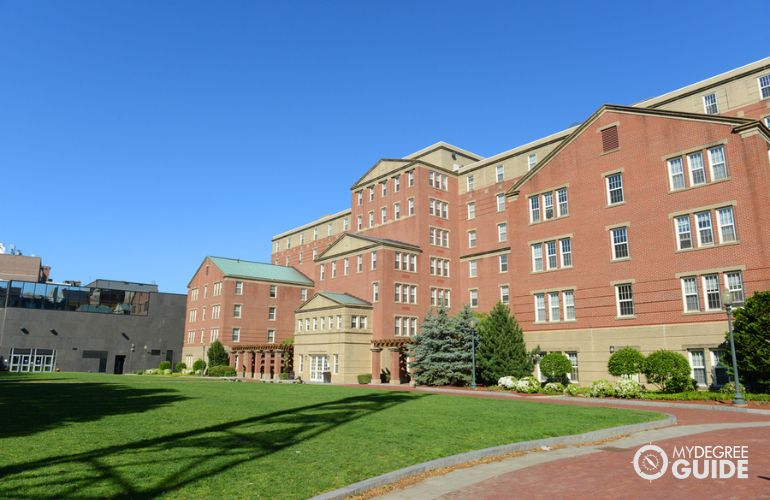
Accredited culinary arts programs have undergone a stringent assessment process to ensure that they are offering a worthwhile academic experience. It’s strategic to look for programs that come from schools with national or regional accreditation.
Editorial Listing ShortCode:
Employers often look more favorably on academic credentials earned at institutions with credible accreditation status. In addition, if you decide to change schools before finishing your degree, or if you want to pursue an advanced degree in the future, it’s beneficial to attend an accredited school. This is because it’s generally much easier to transfer credits from accredited schools.
Financial Aid and Scholarships

Financial aid and scholarship programs may help make your academic goals more attainable. You can begin your search for financial assistance by submitting a Free Application for Federal Student Aid (FAFSA), which determines whether you are eligible for student loans and other forms of federal aid.
You can also check with your state government to see if there are any available grant or loan programs. If you’re a working professional, you may be able to receive tuition assistance or reimbursement from your employer. Many organizations offer financial support to employees who want to broaden their knowledge and enhance their skills in the field.
In addition, you can use an online database or reach out to your preferred school’s financial aid office to inquire about scholarship opportunities that are designed for your degree or personal circumstances.
What Can You Do with a Culinary Degree?
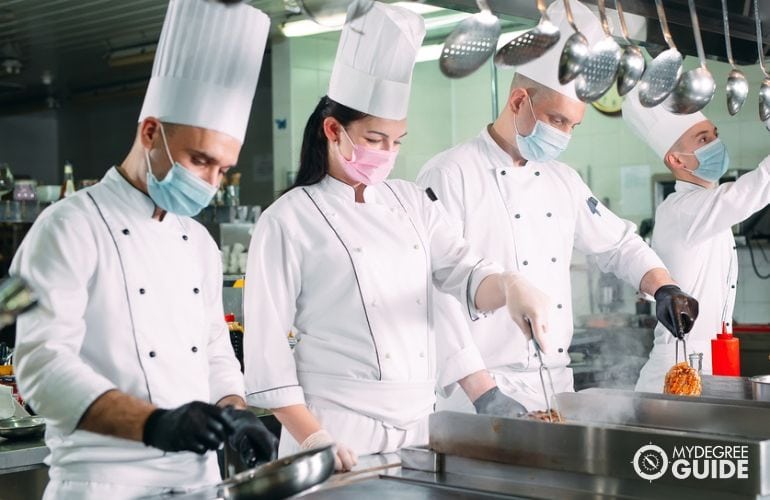
A culinary degree is a strong foundation for a variety of careers both directly and indirectly involved in the food service industry.
Many graduates of culinary arts programs go on to become chefs, sous chefs, and cooks. The salaries of these types of positions can vary depending on your level of experience and type of employer. Other culinary students embark on careers as food scientists, nutritionists, bakers, servers, and managers. Earning a degree may also help you become a food writer who reviews restaurants, creates recipes, and explores international cuisines.
How Long Does It Take to Get a Culinary Arts Degree Online?

The amount of time required to complete an online culinary program depends on the specific program type. These are the typical timelines:
- Certificates and diplomas: Most culinary certificates and diplomas require less than 1 year of study, and many can be finished within 4 to 6 months.
- Associate degrees: An associate degree program typically lasts for 2 years of full-time study, depending on how many credit hours you take each semester.
- Bachelor’s degrees: The average time for full-time students to complete a culinary bachelor’s degree is 4 years.
Accelerated programs and transfer credits may shorten the amount of time required to earn your degree.
How Do Online Culinary Schools Work?

Online culinary schools use modern technology to share information and teach practical skills. Rather than taking courses in a physical classroom, students participate in livestream lectures, discussion boards, and chat sessions.
During an online class, an instructor might demonstrate cooking methods on a camera while students practice, observe, and take notes. Some culinary degree programs also include practical experiences, such as internships, so that students can perfect their techniques.
Online degree programs allow for more flexible schedules so that students can complete their work at the time and place that works best with their other work or life obligations.
Is an Online Culinary School Worth It?
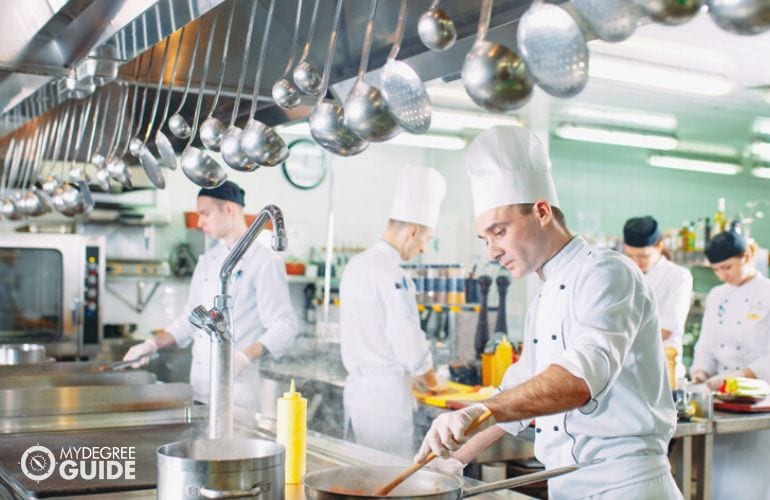
Yes, an online culinary school is worth it for many students. Food service establishments—including restaurants, catering companies, and bakeries—remain popular dining options for the public, so work in this industry is likely to remain in high demand.
Editorial Listing ShortCode:
Data from the Bureau of Labor Statistics reinforces the stability of a career in the culinary arts. Many positions in this field are expected to grow faster than average over the next ten years, including cooks (16% job growth), chefs and head cooks (15%), food service managers (10%), and bakers (8%). With professional training, you may also be better positioned to apply for a role as a manager or head chef.
Universities Offering Online Bachelors in Culinary Degree Programs
Methodology: The following school list is in alphabetical order. To be included, a college or university must be regionally accredited and offer degree programs online or in a hybrid format.

Eastern New Mexico University offers an online program for a Bachelor of Applied Arts and Sciences with a concentration in Culinary Arts. An associate’s degree or 30 credit hours in a relevant field is required for admission. Courses are commonly 4 to 8 weeks long, and a virtual internship is also typically completed after coursework is finished.
Eastern New Mexico University is accredited by the Higher Learning Commission.

Florida International University offers an online program for a BS in Hospitality Management with a concentration in Restaurant and Culinary Management. Potential courses include Foodservice Trends and Challenges, Catering Management, and Culinary Event Management. Courses typically follow a semester schedule, and there are usually start dates in the fall, spring, and summer.
Florida International University is accredited by the Southern Association of Colleges and Schools Commission on Colleges.

Johnson & Wales University offers an online program for a BS in Culinary Arts and Food Services. The program requires an associate degree in culinary arts for admission. Courses tend to be 8 or 16 weeks long, and the program may be completed in as little as 2 years.
Johnson & Wales University is accredited by the New England Commission of Higher Education.

Miami International University of Art & Design offers a BA in Culinary Management program online. At least 48 quarter credits in related courses must be earned before entering the program. The program may be completed in as little as 12 quarters, and there are commonly monthly start dates.
Miami International University of Art & Design is accredited by the Southern Association of Colleges and Schools Commission on Colleges.

The State University of New York–Delhi offers a Bachelor of Business Administration in Culinary Arts Management program online. The opportunity to work for 6 months at Walt Disney World in Orlando, Florida, in the Walt Disney College Program, is typically offered. Value Schools named SUNY–Delhi one of the best online colleges for hospitality management.
SUNY Delhi is accredited by the Middle States Commission on Higher Education.
Getting Your Culinary Arts Degree Online

Earning a culinary arts degree may allow you to achieve upward growth or transform a current hobby into a career. Culinary arts students learn about subjects like food safety, preparation techniques, and baking methods.
A degree in this field is also appropriate for related careers in writing, nutrition, and food science. Whether you want to pursue a certificate, associate’s degree, or bachelor’s degree, an online program format can be a flexible option. Completing a culinary arts program can help you develop a combination of practical skills and theoretical knowledge.
You could take the first step toward a culinary career today by researching online programs from accredited schools.

